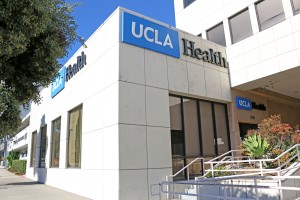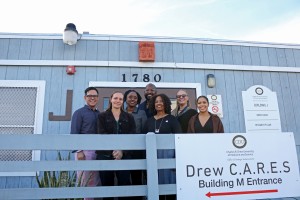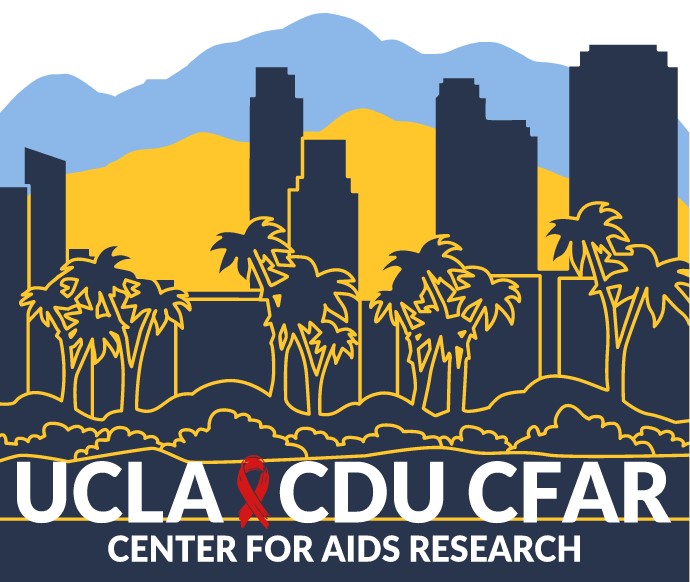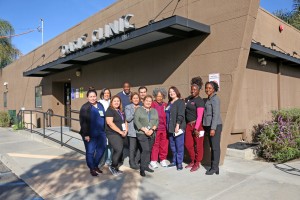The UCLA-CDU CFAR encompasses more than 250 faculty-level HIV researchers across the two campuses and around the globe.
UCLA Research Hubs
Although the 400-acre main campus of UCLA is located in Westwood, researchers affiliated with UCLA work across Los Angeles County including at Harbor-UCLA Medical Center in Torrance, the VA Greater Los Angeles Healthcare System in Westwood and at community-based sites across the county. Teams of researchers and staff are also located south of the main campus at the UCLA CARE Clinic and in West Hollywood at the UCLA Vine Street Clinic. In addition, many of our clinical researchers practice in one of the 160 UCLA Healthcare clinics and 4 Los Angeles County Ryan White Funded HIV Clinics located across the county.
- UCLA Clinical AIDS Research and Education (CARE) Center

CARE Center The UCLA CARE Center is the designated clinical care unit and a research hub for HIV/AIDS at UCLA. CARE has provided outpatient care and management of people with HIV in a dedicated, multidisciplinary clinic since the early 1990’s. The center serves as the HIV medical home to approximately 1200 HIV patients, seen by nineteen HIV specialist physicians. The clinic is a Clinical Research Site (CRS) for the UCLA AIDS Prevention CTU for the ACTG and HPTN and a site for the AIDS Malignancy Consortium Anchor Trial. CARE was recently awarded a contract for Ryan White Clinical Services by the Los Angeles County Division of HIV and STD Programs (DHSP), including support for Medical Care Coordination (MCC) program services, which has been demonstrated to be highly successful at finding and retaining out-of-care people living with HIV and improving HIV treatment outcomes.
- UCLA Vine Street Clinic (UVSC)
The UCLA Vine Street Clinic is a community-based clinic and research site located in the East side of Hollywood, 8 miles from the UCLA campus, 4.5 miles from the UCLA CARE Center and 22 miles from Harbor-UCLA. The main UVSC contribution to HIV research focuses on the intersection of HIV prevention and addiction science in socially marginalized communities, and unique expertise that cuts across the goals of CFAR priority research. The site hosts federally funded medication development and HIV prevention trials (HPTN core site), as well as clinical services. The site has completed over 16,000 patient visits since opening in March 2005. - Biomedical Sciences Research Building (main Westwood site)
UCLA established a basic science hub in HIV research on the first floor in the Biomedical Sciences Research Building. Several UCLA-CDU CFAR Cores – a component of the Centralized Laboratory Support Core (Core C) and a component of the Humanized Mouse and Gene Therapy Core (Core D), are located here. - The Lundquist Institute at Harbor-UCLA Medical Center
The Lundquist Institute is the affiliated research enterprise for the Harbor-UCLA Medical Center which is one of the major safety net hospitals and clinics in the southwest region of Los Angeles County. Harbor-UCLA Medical Center is an affiliated teaching institution of the UCLA School of Medicine. The medical center maintains and staffs an HIV clinic at the medical center itself and another in Long Beach. The Division of HIV Medicine at Harbor- UCLA is an academic research program that provides primary outpatient care and inpatient consultative services for those with HIV infection. Harbor-UCLA Medical Center has participated as a subunit of the UCLA NIH HIV/AIDS CTU for more than 20 years and has a distinguished track record of conducting clinical research and collaboration with the UCLA CARE Center as a component in the UCLA CTU. - VA Greater Los Angeles Healthcare System (VAGLAHS)
The VA Greater Los Angeles Healthcare System is one of the largest health care facilities within the Department of Veterans Affairs. VAGLAHS consists of two ambulatory care centers, a tertiary care facility and 8 community-based outpatient clinics. VAGLAHS serves Veterans residing throughout five counties: Los Angeles, Ventura, Kern, Santa Barbara, and San Luis Obispo. There are 1.4 million Veterans in the VAGLAHS service area. The VAGLAHS is also an active site for the Veterans Aging Cohort Study (VACS), a prospective observational cohort study of HIV-positive and matched HIV-negative veterans in VA care.
CDU Research Hubs
CDU is designated as a minority serving institution by the U.S. Office for Civil Rights and is a recognized Historically Black Graduate Institution (HBGI). The University is a member of the Hispanic Association of Colleges and Universities. Over seventy percent of CDU faculty are from communities of color, and a California Wellness Foundation report estimated that a third of all minority physicians practicing in Los Angeles County, are graduates of CDU medical school and/or residency training programs. CDU’s commitment to underserved communities extends to a focus on social justice, research into social health disparities, and is reflected in work around addressing racial and ethnic disparities in health outcomes related to HIV/AIDS.
- Drew Center for AIDS Research Education and Services (Drew CARES)

Drew C.A.R.E.S team Drew CARES serves as the focal point for all HIV related activities within CDU and also has close ties with both Los Angeles County Public Health, with one of its public health clinics located adjacent to the CDU campus, and other community agencies in South Los Angeles. Drew CARES researchers hold a wide range of graduate degrees spanning biological and medical sciences, behavioral and social sciences, and public health and are dedicated to ensuring excellence in HIV education, research, and service provision for underserved communities, both locally and internationally. Research by Drew CARES is respected worldwide and has been supported by the National Institutes of Health (NIH), the Centers for Disease Control and Prevention (CDC), the California HIV/AIDS Research Program (CHRP), the California Department of Public Health (CDPH), the Los Angeles Department of HIV/STD Programs (DHSP), and other national, state, and local funding agencies.
- CDU Partnership for Unified for Services in HIV (PUSH coalition)
PUSH is a consortium of organizations that provide HIV services to patients in South Los Angeles, an under resourced community that has been hard hit by the HIV epidemic. Priorities are facilitating the highest standards of care and care coordination in the HIV screening, HIV prevention, linkage to care, retention in care, dental, mental health, and substance use disorder services offered by its partners. - Martin Luther King (MLK) OASIS Clinic
Founded in 1984 by a partnership between CDU and DHS Los Angeles County, the OASIS Clinic is one of the oldest minority-run HIV clinics in the US. This HIVspecialty care clinic is staffed by a medical team with years of experience in providing HIV/AIDS treatment, prevention, and social services. Clinical services include comprehensive culturally competent HIV medical evaluation and clinical care, medical specialty and subspecialty care referrals, and benefits assistance. In addition to primary medical care, Oasis Clinic services include mental health and wraparound services, domestic storefront and sexual network HIV testing programs, treatment and prevention navigation services and the Pacific AIDS Education and Training Center. The OASIS Clinic engages with patients across the HIV care continuum — from initial diagnosis to linkage to care, from retention in care to antiretroviral use and viral suppression. Together with our community partners (PUSH Agencies), which include APLA Health, LA County Center for Public Health, MLK Outpatient Center and MLK Community Hospital, we address ending the epidemic by focusing on research areas related to health disparities, prevention and treatment interventions that impact the HIV care continuum.
UCLA and CDU Global Research Hubs In addition to the facilities and programs based in Los Angeles, researchers at UCLA and CDU have extensive partnerships with HIV programs around the globe that are aimed at building global capacity. Below are examples of the international HIV research programs, investigators leading the programs and areas of HIV Research Focus.
| HIV Research Programs | HIV Research Focus |
| Malawi
(Partners in Hope) |
Non-communicable diseases Cervical Cancer HIV testing in men/Linkage to ART |
| South Africa
(University of Cape Town, Desmond Tutu Foundation) |
PrEP in pregnancy HIV-TB and HIV prevention |
| Zambia
(HBC Global Health Consortium) |
Linkage and retention in care for adolescent girls |
| Brazil
(Fundação Oswaldo Cruz, Hospital Nossa Senhora da Conceição) |
Perinatal HIV Transmission HIV testing HIV and other infectious diseases |
| Peru
(Cayetano) |
Community based behavior change STI and HIV risk |


